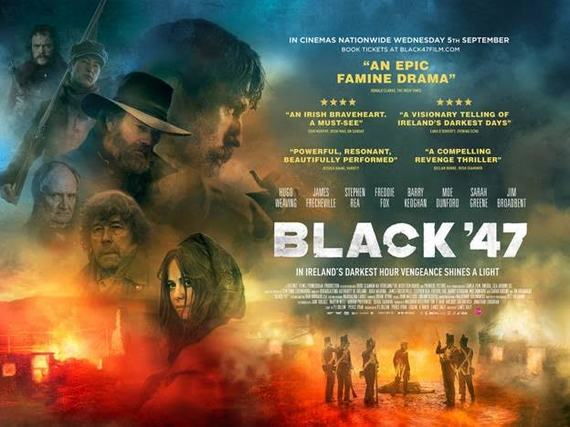The wait is finally over! Irish famine movie “Black 47” reaches US theaters TODAY.
After setting a box office record with its Irish release, the first movie ever to be based on the subject and in the era of the Irish potato famine is finally receiving its US release date, today, Friday, September 28, 2018.
Ahead of its New York premiere, we caught up with the film’s director Lance Daly to talk about the difficulty in taking on such a monumental piece of history; how hard it was to recreate the famine era; and what were his biggest regrets about the parts that were left out of the final movie.
Read more: Review: “Black 47” movie is a must-see for Irish Americans who value their history and heritage
The New York premiere of “Black ‘47” is seeing three screenings being run alongside Irish Screen America. Did you expect this kind of enthusiasm to see the movie in the US? Why is it so important in America?
I've started touting it as the origins story for Irish Americans. Even if they [their ancestors] came over 40 years after the famine, it’s still a tide of emigration that began with that, that opened up so many supply lines of people to America. It just continued after that [the famine] so hopefully, there's some interest.
How hard was it to fight for this project to happen?
It's not an immediately appealing prospect for somebody who's thinking: “Will people go to this movie? Will people have a good time in the theater?"
On the surface, it seems to be a film about suffering, and that’s not something that people are going to go to. There are all those steps of trying to figure out a way to make it enticing but I think all the action and revenge elements do light the touchpaper for a potential audience.
I think people are really glad to look at images of the famine also and access how they feel about that.
It [the famine] affects us; psychologically and culturally. None of us have any memory of it but our attitudes are things that we've inherited, that are created in our specific Irish perspective, that are handed down from that time.
I think particularly the stoicism, the way we don't talk about things. I think that comes from a whole generation that didn't speak about what happened and couldn't seem to.
Read more: PODCAST: "Black 47" - the real history behind the new Irish Famine movie
Even when you talk to people, say in their 70s, and they'll say “well, actually my great-granddad was born during the famine,” they just about reach back and they say people never spoke about it. They just said they were “hard times.”
I heard that phrase a lot of times and read it in a lot of different places.
The scale of the loss is impossible. Losing children to hunger, it's sort of unbearable to think about.
They summed all that up with “there were hard times.”
Well, what happened? “They were hard times.”
Do you think we’ll see more work on this subject in the future now that the barrier has been broken down?

I don’t know if we've broken through a barrier. I think that there's still all the same problems with trying to make a movie set in that time as there was before. The one problem that we've probably solved is that if somebody does do a movie set in 1847, they won't have this sense of the full responsibility of having to tell the whole story.
I've noticed, weirdly, that an under 25s audience are really responsive to the film [in Ireland] and I thought that they would be the least responsive.
A few of them have said to me, “I don't think you realize how nationalistic our generation is.”
It's kind of surprising but I suppose they didn't witness the Troubles. They didn't witness any of the bad things that happened in the name of that so it's sort of a new breed of people who are very proud of a national identity and are also very engaged with this particular history.
Would you consider working on a project about the famine again?
There were so many things we couldn't do.
We couldn't do the workhouses, which is a huge chapter.
Female perspectives and female stories of that time are also not touched on. I think the mother's experience of starving children would be more integral to a story about An Gorta Mór than anything we've told in this story ... but that wasn't the way in this. This was a story about soldiers and about landowners and to my great regret, I didn't find more significant female perspectives but it is an action movie.
The Atlantic crossing isn't told and that's another huge chapter so there are all these other things that can be done and I'm certainly thinking about doing another film.
It was so hard in so many ways [to cover all in one movie].
The subject is obviously extremely important for Irish people. Was there ever any point where it was so hard to make that you felt like leaving it for someone else to do?

James Frecheville in "Black '47."
I just thought I'd made a big error because there was so many things to figure out and so many things that don't meet your expectation.
I think filmmaking is an exercise in dealing with expectations and with the appointment of unmet expectations. You sort of start out with this great idea but then it's like, “oh, we can't have this? Ok, we'll make do.”
Then something else happens and it reduces what you think it can be because you have an idea in your head. That sort of happened a lot but I think we just really had two great editors … and we just worked and worked. I think they did a phenomenal job. Just showing it in Ireland now and seeing the response has made me think “now I'm ok” but it was a lot of regret and uncertainty.
The other thing is, if there's one other pin in the map, you can sort of say “ok, let's aim north or south of that” but there was no way. You're doing stuff and saying “that might be right” but it's very hard to get it all to a place where you think that's as right as it can be now.
It was really heavy.
You can find more information on “Black ‘47” US screenings here.




Comments